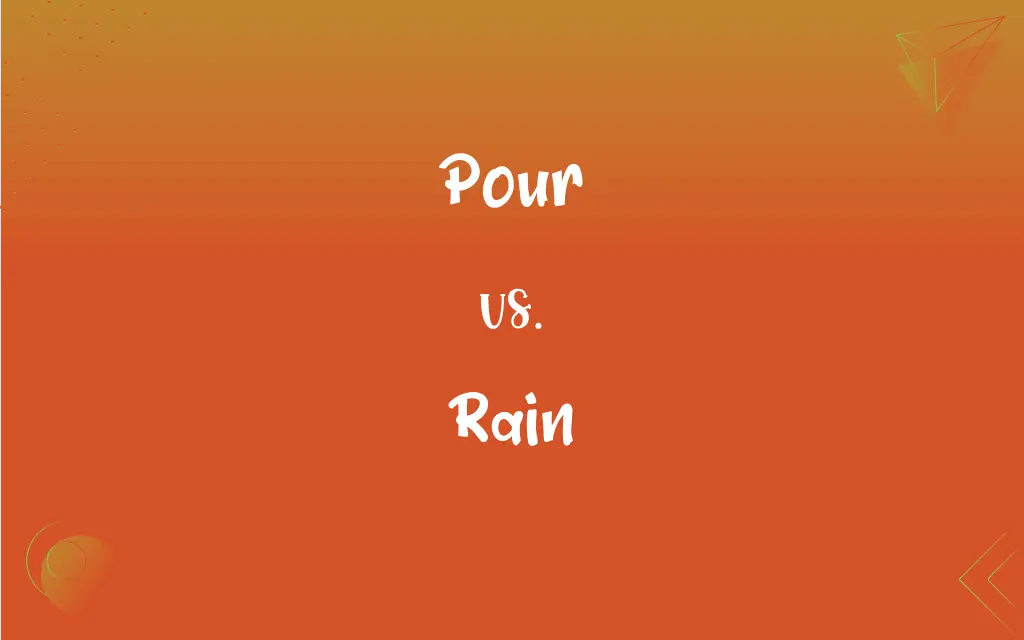Pour vs. Rain: What's the Difference?
Edited by Harlon Moss || By Janet White || Updated on October 5, 2023
"Pour" refers to the action of flowing rapidly in a steady stream, while "rain" refers to water falling from clouds as condensed droplets.

Key Differences
"Pour" and "rain" are both verbs associated with the movement of liquid, but they are used in different contexts and carry distinct nuances. The word "pour" pertains to the act of making a liquid flow from a container or from one place to another. For instance, one can pour milk into a cup or pour concrete to lay a foundation. This term can be applied to a variety of liquids, suggesting a controlled or deliberate flow. On the other hand, "rain" specifically denotes the natural phenomenon of water falling from clouds in the form of droplets.
While "pour" is a versatile verb that can be utilized in numerous situations involving the flow of liquid, "rain" remains rooted in meteorological contexts. It is not limited to just water; other forms, such as acid rain, sleet, or drizzle, further define the kind of precipitation. When one says, "It's pouring outside," they're typically employing "pour" as a colloquialism to indicate that it's raining heavily.
The flexibility of "pour" is evident in its metaphorical uses as well. For instance, emotions can pour out, or people can pour into a venue, suggesting an abundance or intense flow. "Rain," while primarily used to describe weather conditions, can also be used metaphorically, as in "raining praise" or "raining criticism," suggesting a plentiful amount of something.
In sum, while both "pour" and "rain" involve the movement or abundance of a substance, typically liquid, "pour" is a more general term applicable to various situations, whereas "rain" is more specific to atmospheric conditions and the fall of water from the sky.
Comparison Chart
Definition
Flow of liquid from a container or source.
Water droplets falling from the sky.
ADVERTISEMENT
Context
Broad usage in various situations.
Primarily meteorological.
Flexibility
Can refer to liquids, emotions, or crowds.
Primarily water, but can have variations like drizzle.
Metaphorical Use
Yes, e.g., "pour one's heart out."
Yes, e.g., "raining praise."
Dependency
Independent of weather conditions.
Dependent on atmospheric conditions.
Pour and Rain Definitions
Pour
Flow rapidly in a steady stream.
She watched the water pour from the faucet.
ADVERTISEMENT
Rain
A large or overwhelming quantity of things that fall or descend.
It's been raining offers since she became famous.
Pour
Cause a substance to flow over a surface.
They poured concrete to create a pathway.
Rain
The fall of water droplets from the sky.
The rain continued all day.
Pour
To cause (a liquid or granular solid) to stream or flow, as from a container
Poured tea from the pot into the cup.
Rain
To bestow in an abundant or overwhelming manner.
Awards rained down on the young director.
Pour
To pour a liquid or particles into (a container)
Poured a glass of milk.
Rain
Water condensed from atmospheric vapor and falling in drops.
Pour
To empty (a container) of a liquid or granular solid
Poured a bucket of sand on the ground.
Rain
A fall of such water; a rainstorm.
Pour
To send forth, produce, express, or utter copiously, as if in a stream or flood
Poured money into the project.
Poured out my inner thoughts.
Rain
The descent of such water.
Pour
To stream or flow continuously or profusely
Water poured over the dam.
Rain
Rainy weather.
Pour
To rain hard or heavily
It has been pouring for an hour.
Rain
Rains A rainy season.
Pour
To pass or proceed in large numbers or quantity
Students poured into the auditorium.
Rain
A heavy or abundant fall
A rain of fluffy cottonwood seeds.
A rain of insults.
Pour
To serve a beverage, such as tea or coffee, to a gathering
We need someone to pour.
Rain
To fall in drops of water from the clouds.
Pour
A pouring or flowing forth, especially a downpour of rain.
Rain
To fall like rain
Praise rained down on the composer.
Pour
(transitive) To cause (liquid, or liquid-like substance) to flow in a stream, either out of a container or into it.
Pour water from a jug
Pour wine into a decanter
To pour oil onto chips
To pour out sand or dust.
Rain
To release rain.
Pour
To send out as in a stream or a flood; to cause (an emotion) to come out; to cause to escape.
My teacher poured scorn on my attempts at writing.
Rain
To send or pour down.
Pour
(transitive) To send forth from, as in a stream; to discharge uninterruptedly.
Rain
To give abundantly; shower
Rain gifts.
Rain curses upon their heads.
Pour
(intransitive) To flow, pass or issue in a stream; to fall continuously and abundantly.
The rain poured down.
Rain
Condensed water falling from a cloud.
We've been having a lot of rain lately.
The rains came late that year.
Pour
(impersonal) To rain hard.
It's pouring outside.
Rain
(figuratively) Any matter moving or falling, usually through air, and especially if liquid or otherwise figuratively identifiable with raindrops.
Pour
(intransitive) Of a beverage, to be on tap or otherwise available for serving to customers.
Rain
(figuratively) An instance of particles or larger pieces of matter moving or falling through air.
A rain of mortar fire fell on our trenches.
Pour
(intransitive) To move in a throng, as a crowd.
The people poured out of the theater.
Rain
(impersonal) To have rain fall from the sky.
Judging by the black cloud, it will rain later today.
Pour
The act of pouring.
The bartender's inexpert pour left me with a pint of beer that was half foam.
Rain
(intransitive) To fall as or like rain.
Tears rained from her eyes.
Leaves rained from the tree.
Bombs rained from the sky.
Pour
Something, or an amount, poured.
Rain
(transitive) To issue (something) in large quantities.
The boxer rained punches on his opponent's head.
Pour
(colloquial) A downpour, or flood of precipitation.
Rain
Reign.
Pour
Poor.
Rain
Water falling in drops from the clouds; the descent of water from the clouds in drops.
Rain is water by the heat of the sun divided into very small parts ascending in the air, till, encountering the cold, it be condensed into clouds, and descends in drops.
Fair days have oft contracted wind and rain.
Pour
To pore.
Rain
To fall in drops from the clouds, as water; - used mostly with it for a nominative; as, it rains.
The rain it raineth every day.
Pour
To cause to flow in a stream, as a liquid or anything flowing like a liquid, either out of a vessel or into it; as, to pour water from a pail; to pour wine into a decanter; to pour oil upon the waters; to pour out sand or dust.
Rain
To fall or drop like water from the clouds; as, tears rained from their eyes.
Pour
To send forth as in a stream or a flood; to emit; to let escape freely or wholly.
I . . . have poured out my soul before the Lord.
Now will I shortly pour out my fury upon thee.
London doth pour out her citizens !
Wherefore did Nature pour her bounties forthWith such a full and unwithdrawing hand ?
Rain
To pour or shower down from above, like rain from the clouds.
Then said the Lord unto Moses, Behold, I will rain bread from heaven for you.
Pour
To send forth from, as in a stream; to discharge uninterruptedly.
Is it for thee the linnet pours his throat ?
Rain
To bestow in a profuse or abundant manner; as, to rain favors upon a person.
Pour
To flow, pass, or issue in a stream, or as a stream; to fall continuously and abundantly; as, the rain pours; the people poured out of the theater.
In the rude throng pour on with furious pace.
Rain
Water falling in drops from vapor condensed in the atmosphere
Pour
A stream, or something like a stream; a flood.
Rain
Drops of fresh water that fall as precipitation from clouds
Pour
Cause to run;
Pour water over the floor
Rain
Anything happening rapidly or in quick successive;
A rain of bullets
A pelting of insults
Pour
Move in large numbers;
People were pouring out of the theater
Beggars pullulated in the plaza
Rain
Precipitate as rain;
If it rains much more, we can expect some flooding
Pour
Pour out;
The sommelier decanted the wines
Rain
Precipitate as rain.
It might rain later today.
Pour
Flow in a spurt;
Water poured all over the floor
Rain
Water condensed from atmospheric vapor.
The plants need some rain.
Pour
Supply in large amounts or quantities;
We poured money into the education of our children
Pour
Rain heavily;
Put on your rain coat-- it's pouring outside!
Pour
Serve a drink by flowing it into a glass.
Can you pour me some juice?
Pour
Express oneself in an effusive manner.
He began to pour out his feelings to her.
Pour
Arrive in large numbers or quantities.
Fans poured into the stadium.
FAQs
Can it "rain" objects other than water?
Metaphorically, yes, like "raining cats and dogs" or "raining praise."
Can "pour" refer to any liquid?
Yes, "pour" can refer to the flow of any liquid, such as water, juice, or oil.
Can "pour" suggest abundance?
Yes, like when saying news "poured in," suggesting a lot of it.
Is rain always in the form of water?
While typically water, rain can have variations like acid rain or frozen forms like sleet.
Can you "pour" a solid substance?
In some contexts, yes, like "pouring sand" or "pouring cereal."
Does "pour" always imply a rapid flow?
Often, but not always. Context determines the flow's intensity.
Can "pour" be used metaphorically?
Yes, for instance, emotions can "pour out" or people can "pour into" a venue.
Is "pouring" a synonym for heavy rain?
Colloquially, yes. Saying "it's pouring" typically means it's raining heavily.
What causes rain to occur?
The condensation of water vapor in the atmosphere, which then becomes heavy and falls.
Is drizzle a form of rain?
Yes, drizzle refers to light rain with very small, fine droplets.
Can "pour" refer to the movement of people?
Yes, as in "People poured into the concert hall."
Is snow a form of rain?
Both are precipitation, but snow is frozen, while rain is liquid.
How is "rain" formed?
Rain forms when condensed water vapor in the atmosphere falls due to gravity.
What's another word for light rain?
"Drizzle" or "sprinkle" can denote light rain.
Can "rain" be used as a verb?
Yes, as in "It might rain later."
Is "rain" always related to weather?
Typically, but metaphorical uses like "raining praise" are exceptions.
What's the action of pouring wine called?
It's often referred to as "pouring" wine, but can also be "decanting" in certain contexts.
Can "rain" have variations in intensity?
Yes, from light drizzles to heavy downpours or storms.
Is "pouring" always intentional?
Not necessarily. A jug might accidentally pour out if tipped over.
What's the act of pouring a drink called?
It's simply referred to as "pouring" a drink.
About Author
Written by
Janet WhiteJanet White has been an esteemed writer and blogger for Difference Wiki. Holding a Master's degree in Science and Medical Journalism from the prestigious Boston University, she has consistently demonstrated her expertise and passion for her field. When she's not immersed in her work, Janet relishes her time exercising, delving into a good book, and cherishing moments with friends and family.
Edited by
Harlon MossHarlon is a seasoned quality moderator and accomplished content writer for Difference Wiki. An alumnus of the prestigious University of California, he earned his degree in Computer Science. Leveraging his academic background, Harlon brings a meticulous and informed perspective to his work, ensuring content accuracy and excellence.































































